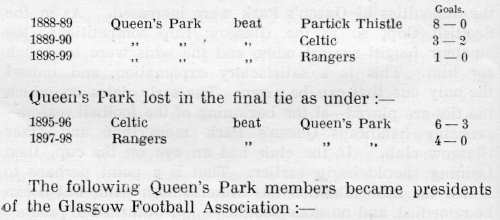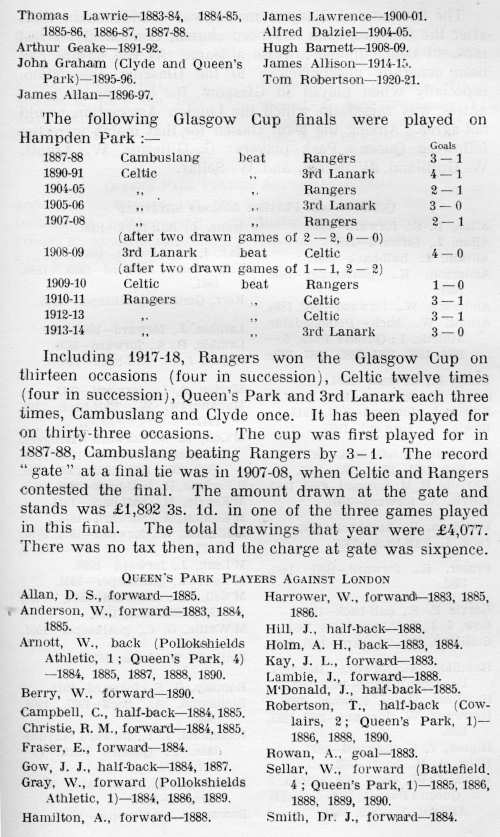The Glasgow Football Association is another institution
whose genesis is largely attributable to the propagating energies of the
Queen's Park officials. The Association had its outcome through a challenge
which came from the Edinburgh Association, founded in 1877, to the Scottish
Football Association, to play an Inter-City match between Glasgow and
Edinburgh. It was considered infra dig for a national association to
place itself on a level with a sectional association, and the committee of
the Scottish Football Association, being in sympathy with the idea,
suggested that the Glasgow members of the Association should form themselves
into a committee, with a view to meeting the wishes of the metropolitans.
Mr. Thomas Lawrie (Queen's Park) may be said to have been the founder of the
Glasgow Association, as he called a meeting of certain Glasgow clubs for
27th January, 1883, over which he presided, Messrs. R. T. Dow (Thistle), A.
Good (Cowlairs), J. Park (Clyde), and Peter M'Neil (Rangers) being also
present. Mr. J. K. M'Dowall, the secretary of the Scottish Association, was
to take all correspondence in hand, and was the first, and remains still,
secretary of the Glasgow Association. It was the unanimous opinion of this
meeting that an Inter-City match should be arranged, the opening match to
take place in Edinburgh. Having come to this determination, Mr. Thomas
Lawrie called another meeting of all the Glasgow clubs, which was held at 11
Carlton Place, on 6th March, 1883, for the purpose of forming an association
of Glasgow clubs. Mr. Lawrie explained the general usefulness and benefits
which would result from the formation of an association among the Glasgow
clubs. Such a body was calculated to assist and strengthen the parent
Association by relieving it of those duties resting exclusively on the city
clubs. Mr. Charles Campbell (Queen's Park) was of opinion that the new body
would tend to foster the game in the city, and encourage the efforts of the
younger clubs. Mr. J. W. Mackay (Rangers) also supported the movement. Mr.
Lawrie formally moved : " That this meeting hereby resolve to form an
association of the clubs in Glasgow and suburbs, under the style and form of
' The Glasgow Football Association.' " This was carried unanimously. The
following seven clubs were given the right to send representatives to
committee : Queen's Park, Rangers, 3rd Lanark, Northern, Partick, Clyde, and
Pollokshields Athletic. A committee was appointed to draw up a constitution
and rules, which were submitted to a general meeting on 12th April, 1883,
the following clubs being represented : Queen's Park, Rangers, 3rd Lanark,
Clyde, Partick Thistle, Pollokshields Athletic, South-Western, Partick,
Luton, Northern, and Thistle—eleven clubs altogether. Luton subsequently
amalgamated with South-Western. Battlefield and Cowlairs joined the
Association in this year, though not represented at the meeting, making
thirteen clubs on the roll to begin with. Mr. Thomas Lawrie (Queen's Park)
was appointed the first president of the Association, a position he retained
for five years. The opening engagement between the two centres under the
auspices of the new Association took place on 7th April, 1883, at Powderhall
Grounds, Edinburgh, when Glasgow scored its first victory by two goals to
one. The Edinburgh Association was very insistent, not to say offensive,
over the proposed match, claiming to be an Association on an equal footing
with the Scottish Football Association—a claim which could not be admitted.
This claim hurried matters, and made the formation of the Glasgow
Association a necessity. The following team represented the Western city :
G. Gillespie (Rangers); W. S. Wylie (Partick) and A. H. Holm (Queen's Park);
C. Campbell (Queen's Park) and J. M'Intyre (Rangers); E. Fraser (Queen's
Park), F. W. Shaw (Pollokshields Athletic), W.Anderson (Queen's Park), J.
Inglis (Rangers), W. Gray (Pollokshields Athletic), and J. L. Kay (Queen's
Park). This team played in black and white jerseys, the colours of the
Queen's Park, and each member was presented with a badge bearing the St.
Mungo emblem. The Association was put in funds from the very start,- as its
share of the gate at Edinburgh yielded some £50. The committee was raised to
eleven, including the President, Mr. Lawrie, and the treasurer, Mr. J. W.
Mackay. Matches were arranged with London, at London, for December, 1883 ;
with Sheffield, at Sheffield, 16th February, 1884; and with Birmingham, at
Birmingham, 12th January, 1884. Lancashire and Notts Associations desired
matches, but the Association decided such county fixtures could not be
undertaken. These were supervised by the Scottish Association. The Queen's
Park strongly opposed the introduction of a Glasgow Gup competition at the
annual general meeting, 17th May, 1887. There Mr. Kirkwood (3rd Lanark) made
a motion that the committee recommend the desirability of instituting a cup
competition. To this Mr. Arthur Geake (Queen's Park) moved a direct
negative. The amendment was lost by fifteen votes to two, a majority which
distinctly established the desire of the vast majority of the city clubs to
have a cup competition of their own. After the formation of the Scottish
League in 1890, the ties for the Glasgow Cup were drawn before the season
started, and played off early in the season, so as not to interfere with the
League fixtures, which are arranged each year before the football season
commences, dates being left vacant for the Glasgow Cup ties —an arrangement
which has been found to work satisfactorily, and is convenient to all
parties.
It will be remembered that Sheffield Association, in
1872, was most desirous of playing a match with Queen's Park, just risen
into International fame—a challenge the club might have taken up had not a
move then been made by it to found a National Association for Scotland. The
correspondence in connection with this match was handed over to the Scottish
Association, with the result that Sheffield was accommodated, a purely
Glasgow team being selected by the new Scottish Association to open a long
series of representative games between the two cities. This game was played
in February, 1874. The Glasgow team was : R. Gardner (Clydesdale) ; D.
Wotherspoon (Clydesdale) and Joseph Taylor (Queen's Park); G. Campbell
(Queen's Park) and J. J. Thomson (Queen's Park), captain; J. B. Weir
(Queen's Park), Angus M'Kinnon (Queen's Park), J. R. Wilson (Clydesdale), W.
M'Kinnon (Queen's Park), H. M'Neil (Queen's Park), and Fred. Anderson
(Clydesdale). The game was played at Sheffield, under Sheffield rules, and
ended in a draw—two goals each. It should be noted that ten of the players
were members or ex-members of Queen's Park, as R. Gardner and D. Wotherspoon
had left the senior club that season, and F. Anderson a short time before,
and all three had joined Clydesdale. The representation in the following
season, 1875, when the game was played at Hampden Park, was more
diversified, not a single Queen's Park man being in the eleven. On this
occasion Association rules obtained. A victory for Glasgow by 2-0 was the
result. The Scottish Association controlled the destinies of this Inter-City
match until the Glasgow Association came into being in 1883, and the first
match under the new auspices was played at Sheffield, 16th February, 1884,
and won by 2-1. During the first twenty years of contests between Glasgow
and Sheffield, the "Blades" had a majority of goals on two occasions only,
three games being drawn. The new Association played one match against
Dumbartonshire, in 1884, and another with Birmingham as opponents in 1885,
and Aberdeen was once met, in 1892. The series against London came to an end
in 1891. The only Inter-City game undertaken by the Glasgow Association is
now that against Sheffield, which, with the cup competition, constitutes the
chief end and aim of its existence.
It is very difficult to account for the comparative,
indeed almost complete, failure of Queen's Park in the annual struggle for
this handsome trophy. The cup has come into the possession of the club
thrice only, in 1888-89, 1889-90, and in 1898-99, and it has reached the
final on only five occasions altogether—not a very satisfactory record. The
only excuse that can be offered on its behalf is, that the cup competition
was established at the height of the great crisis in the history of
Association football over the professional question, when veiled
professionalism was rampant in Scotland. Though the paid player was not
recognised in Scotland until 1893, he was an active participator in the
football of the period, and, when the cloak was thrown off, the difficulties
of Queen's Park were increased. As in the Scottish Cup, so in the Glasgow
Cup competitions, the amateur fought against odds, and the odds were too
much for him. This is a satisfactory explanation, and indeed the only one
that can be given. The early dates on which the ties are played—at the
beginning of the football season— Probably handicaps Queen's Park more than
any other Glasgow club. If the club had an eye on the cup, then training
should begin earlier. That is a point perhaps to which too little attention
has hitherto been paid, but it can be remedied, and no stone should be left
unturned to produce better results in this and the national competition. The
Scottish League has done much to safeguard the retention of the Queen's Park
players, but it is not within its power to control the individual, for whom
the allurements of a professional career may prove too much, driven by
personal necessity or natural inclination. This is a feature which must each
season present itself, and must be faced, if success has to be attained.
The Glasgow Association clubs were not at all satisfied
that their interests were being faithfully attended to on the council of the
Scottish Football Association, and considered that Celtic and Rangers
representatives from the Glasgow Football Association, on that council,
ignored the claims and interests of clubs other than their own. Clyde and
Partick Thistle were the ringleaders in this matter, and these clubs called
a meeting of the neglected clubs for 2nd May, 1912, at which Queen's Park,
3rd Lanark, Clyde, and Partick Thistle were represented. The quartette
agreed on common action, entering into an arrangement whereby two of these
four clubs would be directly represented during season 1912-13, and the
other two during the following season, Clyde and Queen's Park to have
representation first. Celtic and Rangers were invited to a further meeting
on 9th May to discuss matters. The sitting clubs were informed of the new
scheme to send the honours round, but their representatives would not commit
themselves until they had consulted their directors. However, the scheme was
to go on, and if found unsatisfactory some alternative scheme would be
tried. The arrangement fell through after a year's trial, Partick Thistle
withdrawing from the compact.
The Queen's Park won the Glasgow Cup in the following
years:—





